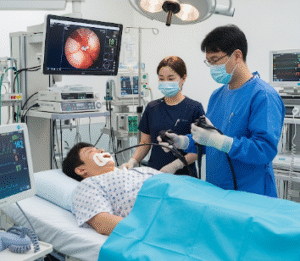Overview
Hashimoto’s Disease, also known as chronic lymphocytic thyroiditis, is an autoimmune disorder that leads to gradual thyroid gland dysfunction. In Korea, it is one of the most common causes of hypothyroidism, particularly affecting middle-aged women. With early diagnosis and proper treatment, patients can effectively manage hormone levels and maintain normal daily functioning.
What is Hashimoto’s Disease?
Hashimoto’s Disease occurs when the immune system attacks the thyroid gland, causing inflammation and impaired hormone production. This autoimmune condition often progresses slowly and can lead to hypothyroidism, where the body lacks sufficient thyroid hormones. It commonly affects adults, but can also appear in younger individuals.
Symptoms
- Fatigue and low energy
- Weight gain despite normal diet
- Cold intolerance
- Dry skin and hair thinning
- Constipation
- Puffy face and swelling in the neck (goiter)
- Depression or mood changes
- Slow heart rate
Causes
- Autoimmune response causing the body to attack thyroid tissue
- Genetic predisposition, often with a family history of thyroid or autoimmune disorders
- Environmental triggers such as excessive iodine intake, radiation exposure, or viral infections
Risk Factors
- Female gender (especially ages 30–50)
- Family history of thyroid disease or autoimmune disorders
- Presence of other autoimmune conditions, such as type 1 diabetes or rheumatoid arthritis
- High iodine intake
- History of thyroid surgery or radiation therapy
Complications
If untreated, Hashimoto’s Disease can result in:
- Severe hypothyroidism leading to fatigue, swelling, and cognitive decline
- Goiter and thyroid enlargement
- Heart problems, including bradycardia and increased cholesterol levels
- Myxedema in advanced, untreated cases (rare but life-threatening)
- Infertility or pregnancy complications
Prevention
- Regular thyroid function screening, especially if at risk or symptomatic
- Maintaining a balanced diet without excessive iodine
- Monitoring other autoimmune conditions closely
- Seeking prompt medical care for thyroid enlargement or hormonal symptoms
Treatment Options in Korea
Treatment in Korea focuses on hormone replacement and regular monitoring:
- Levothyroxine therapy:
- Standard treatment to replace deficient thyroid hormone and maintain normal metabolism.
- Regular monitoring:
- Blood tests for TSH, T3, and T4 levels to adjust medication dosage as needed.
- Management of goiter:
- Surgery is rarely required but may be performed in cases of large thyroid enlargement causing symptoms.
- Specialized care:
- Endocrinologists at hospitals like Seoul National University Hospital, Samsung Medical Center, and Asan Medical Center provide comprehensive care and follow-up.
- Lifestyle adjustments:
- Balanced diet, regular exercise, and stress management to support overall thyroid health.
With consistent treatment and monitoring, most patients in Korea can lead normal, healthy lives with well-controlled Hashimoto’s Disease.













